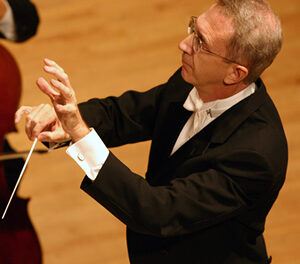World premieres occur with relative infrequency in the symphonic world, and occur with even less frequency in North Carolina. However, the Western Piedmont Symphony presented the absolute world premiere of Meira Warshauer’s First Symphony at its third Masterworks concert of the season at First Baptist Church in Hickory.
Joining the orchestra was guest quartet, the Hyperion String Quartet, who sat in the first chairs of the violin, viola, and cello sections. The quartet, Amanda Brown Brin, first violinist, Rachel Brown Englander, second violinist, Travis Maril, violist, and Jonathan Brin, cellist, is now the Joseph Fisch/Joyce Axelrod Resident String Quartet at San Diego State University. This concert was the culmination of their two week residency in Hickory.
The program opened with Hebrides Overture (Fingal’s Cave) by Felix Mendelssohn (1809-47). He wrote this piece, a favorite orchestral concert opener, following a trip to Scotland in 1829. The orchestral ensemble playing set the standard – very high – for the rest of the concert.
A seldom-heard work, Concertino No. 4 in E-flat Major, Op. 4, by Ferdinand David (1810-73), followed. David was the concertmaster of the Leipzig Gewandhaus orchestra at the time Mendelssohn was director. David also played the premiere of Mendelssohn’s only violin concerto. Few of David’s many compositions have remained in print.
Haim Avitsur, who previously appeared in Hickory with the Degas Quartet, was the trombone soloist. Mr. Avitsur is the Principal Trombonist of the Charlottesville Symphony Orchestra and is on the faculty of the University of Virginia. In his playing of David’s Concertino, he demonstrated the agility and versatility of the trombone, and command of his instrument, from the loud and silky to the soft and sweet. He exhibited beautiful tone and control throughout a demanding piece, especially in the second movement funeral march. For an encore, he played a solo rendition of the hymn “Amazing Grace,” with great tenderness and passion.
Following intermission, the Western Piedmont Symphony presented the world premiere of Meira Warshauer’s Symphony No. 1, “Living, Breathing Earth.” Warshauer (b.1949), a native of Wilmington, NC, studied at Harvard, the New England Conservatory of Music, and the University of South Carolina, and is currently on the faculty of Columbia College in Columbia, SC. She has devoted much of her music to Jewish themes, which is how I first became acquainted with her works, a story too long to be included here.
The Symphony is a joint commission by the Western Piedmont Symphony, the South Carolina Philharmonic, and the Dayton (Ohio) Philharmonic orchestras. It will be heard again in Columbia in March and in Dayton in April. Addressing the audience prior to its performance, the composer said that she wrote the symphony as a love song to the earth. It consists of four movements: I. Call of the cicadas, II. Tahuayo River at night, III. Sunlight and butterflies, and IV. Earth’s rotation. The work is more effects than it is melodies and themes, but what effects!
In the first movement, nature could not provide better sound effects of the cicadas, the orchestra buzzing and chirping throughout. The second movement recalls a nighttime canoe ride in the Peruvian rainforest, with the sparkling reflections of stars and fireflies in the dark, still water. This section is so gorgeous and emotional that it could bring tears to one’s eyes. The third depicts the playful dance of the butterflies and sunlight at the river’s edge. The fourth movement takes us into space, where we look onto the living, breathing, pulsating earth and its many changing colors.
The orchestra played this symphony with all its heart and soul. Deserving of special mention is the percussion section, as this work is truly a concerto for percussion. They did a fine job, jumping between the many usual and strange instruments that they were required to play.
“Living, Breathing Earth” deserves to be heard many, many more times, not only for its message that life on earth is in danger, and that we must be good stewards of the environment, but because it is such beautiful music.











